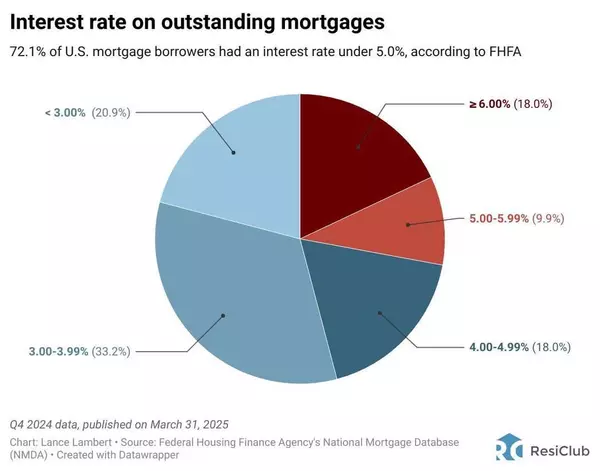Why Some Homes Sell Faster Than Others

As you think ahead to your own move, you may have noticed some houses sell within days, while others linger. But why is that? As Redfin says:“. . . today’s housing market has been topsy-turvy since the pandemic. Low inventory (though rising) and high prices have created a strange mix: Some homes are
Read MoreYour Home Equity Could Make Moving Possible

Some HighlightsThanks to recent home price appreciation, homeowners have near record amounts of equity – and you may too. On average, homeowners have $311K worth of equity.Once you sell, you can use it to fund your down payment on your next home or maybe even to buy a smaller house in cash. If you w
Read MorePaused Your Moving Plans? Here’s Why It’s Time To Hit Play Again

It’s not really a surprise that 70% of buyers paused their home search last year. Maybe you were one of them. And if so, no judgment. Conditions just weren’t great.Inventory was too low, prices were too high, and mortgage rates were bouncing all over. That made it really hard to find a home you love
Read MoreYou Finally Have More Options for Your Move

Some HighlightsIf you put your home search on hold because you couldn’t find anything you liked in your budget, it’s time to try again. There’s a much wider selection of homes for sale, with more fresh listings hitting the market each month.With more options come more possibilities. Connect with an
Read MoreWhat’s Your House Worth Now? The Answer May Surprise You
Let’s talk about something you might not check nearly as often as your bank account – and that’s how much your home is worth. But when it comes to your financial situation, it’s an important thing to remember. When’s the last time you had a professional show you the value of your home?Think about it
Read MoreDon’t Miss This Prime Spring Window To Sell Your House

According to Realtor.com, the best week to list your house this year was April 13–19. And since that week has come and gone, you might be wondering: did I miss my chance? Not at all – and here’s why.That’s just one source’s take, based on their own research. Other organizations run similar studies.
Read MoreIf the Asking Price Isn’t Compelling, It’s Not Selling

Some HighlightsUnfortunately, a lot of sellers today are setting their asking price too high. That’s leading to an uptick in price cuts.Some of the most common reasons this is happening are that they’re not paying attention to current market conditions or they’re trying to leave room for negotiatio
Read MoreDo You Think the Housing Market’s About To Crash? Read This First

Lately, it feels like a lot of people have been asking the same question: “Is the housing market about to crash?”If you’ve been scrolling through social media or watching the news, you might have seen some pretty scary headlines yourself. That’s why it’s no surprise that, according to data from Clev
Read MoreInterest Rates on Outstanding Mortgages

Real Estate Market Update! Did you know that a significant majority – 72.1% – of U.S. mortgage borrowers are currently enjoying interest rates below 5.0%? That's according to the latest FHFA data from Q4 2024! Looking at the breakdown, a large portion has rates in the 3.00-3.99% (33.2%) and
Read MorePaused Your Moving Plans? Here’s Why It Might Be Time To Hit Play Again

Last year, 70% of buyers abandoned their home search – and maybe you were one of them. It makes sense. Inventory was low, prices were high, and mortgage rates were up and down like a rollercoaster. All of that made it really hard to find a home you loved – and could afford.But guess what? The market
Read MoreThe Best Week To List Your House Is Almost Here – Are You Ready?

If selling your house is on your to-do list this year, the time to start prepping is now. That’s because experts say the best week to list your house is coming up fast.A recent Realtor.com study analyzed years of housing market trends (excluding 2020 since it was an outlier) and found that April 13–
Read More4 Things To Expect from the Spring Housing Market

Spring is in full swing, and the housing market is picking up along with it. And if you’ve been wondering whether now is the right time to buy or sell, here’s the inside scoop on why this spring may be a great time to make your move.1. There Are More Homes for SaleAfter a long stretch of tight inven
Read MoreHow Buying or Selling a Home Helps Your Local Economy

Whether you’re buying or selling a house, here’s something to think about that most people don’t. Your decision doesn’t just impact your life and your family’s, it sparks a ripple effect that has a positive impact on your entire community.Every year, the National Association of Realtors (NAR) puts o
Read MoreIs It Time To Put Your House Back on the Market?

If you took your house off the market in late 2024, you’re not the only one. Newsweek reports that data from CoreLogic and the Wall Street Journal (WSJ) says nearly 73,000 homes were pulled from the market in December alone – that's more than any other December going all the way back to 2017 (see gr
Read MoreDo You Know What Your House Is Really Worth?

Some HighlightsOver the past 5 years, home prices have risen dramatically. If you own a home, that means your house may be worth a lot more than you think. Nationally, prices are up nearly 60% since 2019. And, if selling has been on your mind, you can use that bigger-than-expected return to power
Read MoreHeaded Back Into the Office? You May Decide To Move

It’s no secret that remote work has surged over the last few years. And that flexibility gave a lot of people the freedom to move — and work — from wherever they wanted.But now, a growing number of companies are requiring employees to return to the office. And that’s leading some people to make deci
Read MoreWhy a Pre-Listing Inspection May Be Worth It in Today’s Market

Selling a house comes with a lot of moving pieces, and the last thing you want is a deal falling apart over unexpected repairs uncovered during the buyer’s inspection. That’s why it pays to anticipate potential issues before buyers ever step through the door. And one way to do that is with a pre-lis
Read MoreMore Buyers Are Making Moves — Is It Time To Sell?

More people are taking steps to buy a home. And, if you’ve been waiting for the right time to move, this may be the sign you’ve been looking for.For the past few years, a lot of would-be homebuyers hit pause on their plans. With rising mortgage rates and affordability challenges, buying just didn’t
Read MoreWhat Should Home Owners Do If Considering Selling

Selling a home can be an exciting yet daunting task, especially if you're aiming to list your property in the spring. The real estate market tends to heat up during this season, with many buyers actively looking for their dream homes. To ensure your property stands out and fetches the best price, th
Read MoreDo You Know How Much Your Home Is Worth?

Over the past few years, you’ve probably seen a whole lot of headlines about how home prices keep going up. But have you ever stopped to think about what that actually means for your home?Home prices have risen dramatically over the past five years — far more than usual. And if selling has been on y
Read More
Categories
Recent Posts













